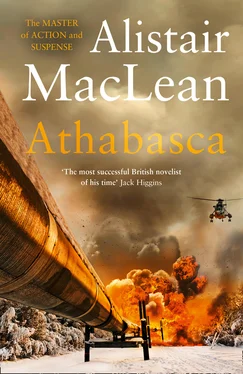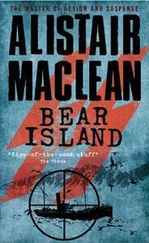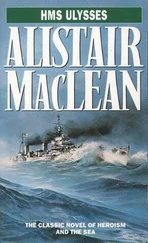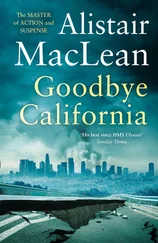“Let’s have him in, shall we?”
“You’ll have to wait, I’m afraid. He’s down in Fairbanks. Back tonight, if the weather holds up. Depends on visibility.”
“Blizzard season?”
“We don’t have one. Precipitation on the North Slope is very low, maybe six inches in a winter. High winds are the bugaboo. They blow up the surface snow so that the air can be completely opaque for thirty or forty feet above the ground. Just before Christmas a few years ago a Hercules, normally the safest of aircraft, tried to land in those conditions. Didn’t make it. Two of the crew of four killed. Pilots have become a bit leery since – if a Hercules can buy it, any aircraft can. These high winds and the surface snowstorms they generate – that snow can be driving along at 70 miles an hour – are the bane of our existence up here. That’s why this operations centre is built on pilings seven feet above ground – let the snow blow right underneath. Otherwise we’d end the winter season buried under a massive drift. The pilings, of course, also virtually eliminate heat transfer to the permafrost, but that’s secondary.”
“What’s Bronowski doing in Fairbanks?”
“Stiffening the thin red line. Hiring extra security guards for Fairbanks.”
“How does he set about that?”
“Approach varies, I suppose. Really Bronowski’s department, Mr Dermott. He has carte blanche in those matters. I suggest you ask him on his return.”
“Oh, come on. You’re his boss. He’s a subordinate. Bosses keep tabs on their subordinates. Roughly, how does he recruit?”
“Well. He’s probably built up a list of people whom he’s personally contacted and who might be available in a state of emergency. I’m honestly not sure about this. I may be his boss, but when I delegate responsibility I do just that. I do know that he approaches the chief of police and asks for suitable recommendations. He may or may not have put an ad. in the All-Alaska Weekly – that’s published in Fairbanks.” Finlayson thought briefly. “I wouldn’t say he’s deliberately close-mouthed about this. I suppose when you’ve been a security man all your life you naturally don’t let your left hand know what the right hand’s doing.”
“What kind of men does he recruit?”
“Almost all ex-cops – you know, ex-State troopers.”
“But not trained security men?”
“As such, no, although I’d have thought security would have come as second nature to a State trooper.” Finlayson smiled. “I imagine Sam’s principal criterion is whether the man can shoot straight.”
“Security’s a mental thing, not physical. You said ‘almost all’.”
“He’s brought in two first-class security agents from outside. One’s stationed at Fairbanks, the other at Valdez.”
“Who says they’re first class?”
“Sam. He hand-picked them.” Finlayson rubbed his drying beard in what could have been a gesture of irritation. “You know, Mr Dermott, friendly, even genial you may be, but I have the odd impression that I’m being third-degreed.”
“Rubbish. If that were happening, you’d know all about it, because I’d be asking you questions about yourself. I’ve no intention of doing so, now or in the future.”
“You wouldn’t be having a dossier on me, would you?”
“Tuesday, September 5, 1939, was the day and date you entered your secondary school in Dundee, Scotland.”
“Jesus!”
“What’s so sensitive about the Fairbanks area? Why strengthen your defences there particularly?”
Finlayson shifted in his seat. “No hard and fast reason, really.”
“Never mind whether it’s hard and fast. The reason?”
Finlayson drew in his breath as if he were about to sigh, then seemed to change his mind. “Bit silly, really. You know how whisperings can generate a hoodoo. People on the line are a bit scared of that sector. You’ll know that the pipeline has three mountain ranges to traverse on its 800-mile run south to the terminal at Valdez. So, pump stations, twelve in all. Pump Station No. 8 is close to Fairbanks. It blew up in the summer of ’77. Completely destroyed.”
“Fatalities?”
“Yes.”
“Explanations given for this blow-up?”
“Of course.”
“Satisfactory?”
“The pipeline construction company – Alyeska – were satisfied.”
“But not everyone?”
“The public was sceptical. State and Federal agencies withheld comment.”
“What reason did Alyeska give?”
“Mechanical and electrical malfunction.”
“Do you believe that?”
“I wasn’t there.”
“The explanation was generally accepted?”
“The explanation was widely disbelieved.”
“Sabotage, perhaps?”
“Perhaps. I don’t know. I was here at the time. I’ve never even seen Pump Station No. 8. Been rebuilt, of course.”
Dermott sighed. “This is where I should be showing some slight traces of exasperation. Don’t believe in committing yourself, do you, Mr Finlayson? Still, you’d probably make a good security agent. I don’t suppose you’d like to venture an opinion as to whether there was a cover-up or not?”
“My opinion hardly matters. What matters, I suppose, is that the Alaskan press was damned certain there was, and said so loud and clear. The fact that the papers appeared unconcerned about the possibility of libel action could be regarded as significant. They would have welcomed a public enquiry: one assumes that Alyeska would not have.”
“Why were the newspapers stirred up – or is that an unnecessary question?”
“What incensed the press was that they were prevented for many hours from reaching the scene of the accident. What doubly incensed them was that they were prevented not by peace officers of the State but by Alyeska’s private guards, who, incredibly, took it upon themselves to close State roads. Even their local PR man agreed that this amounted to illegal restraint.”
“Anybody sue?”
“No court action resulted.”
“Why?”
When Finlayson shrugged, Dermott went on: “Could it have been because Alyeska is the biggest employer in the State, because the lifeblood of so many companies depends on their contracts with Alyeska? In other words, big money talking big?”
“Possibly.”
“Any minute now I’ll be signing you up for Jim Brady. What did the press say?”
“Because they’d been prevented for a whole day from getting to the scene of the accident, they believed Alyeska employees had been working feverishly during that time to clean up and minimise the effects of the accident, to remove the evidence of a major spillage and to conceal the fact that their fail-safe system had failed dangerously. Alyeska had also – the press said – covered up the worst effects of the fire damage.”
“Might they also have removed or covered up incriminating evidence pointing to sabotage?”
“No guessing games for me.”
“All right. Do you or Bronowski know of any disaffected elements in Fairbanks?”
“Depends what you mean by disaffected. If you mean environmentalists opposed to the construction of the pipeline, yes. Hundreds, and very strongly opposed.”
“But they’re open about it, I assume – always give their full names and addresses when writing to the papers.”
“Yes.”
“Besides, environmentalists tend to be sensitive and nonviolent people who work within the confines of the law.”
“About any other disaffected types, I wouldn’t know. There are fifteen thousand people in Fairbanks, and it would be optimistic to expect they’re all as pure as the driven snow.”
“What did Bronowski think of the incident?”
“He wasn’t there.”
Читать дальше












